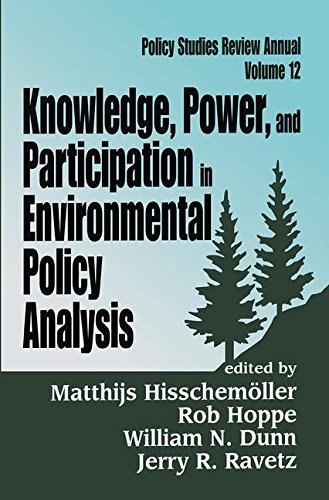
Knowledge, Power, and Participation in Environmental Policy Analysis PDF
500 Pages·2001·4.3512 MB·other
Most books are stored in the elastic cloud where traffic is expensive. For this reason, we have a limit on daily download.
Preview Knowledge, Power, and Participation in Environmental Policy Analysis
Description:
This volume probes practical dilemmas and competing re- search perspectives in environmental policy analysis. Scholars working in different fields, research traditions, societies, and policy domains offer significant insights into the processes and consequences of environmental policy making. Part 1, "Coping with Boundaries," describes present-day conflict between experts and greater public participation in environmental policy. It shows that the institutionalization of increasingly complex environmental problems has led to a conflict between technocracy and democracy. Part 2, "The Transnational Challenge," examines modes of cooperation between grassroots movements, scientists, and regional authorities in the United States and Canada. These and other modes of cooperation laid the foundations for the Great Lakes Water Quality Agreement, increased the effectiveness of air pollution treaties, and increased climate change. Part 3, "Bio-Hazards: Policies and Paralysis," deals with environmental prob-lems closest to the everyday concerns of the public at large because they have immediate implications for food safety and other values. Part 4, "The Citizens' Perspective," focuses on citizen vis--vis environmental policy, noting that in order to make policies work citizens must be willing and able to participate in policy-making and cooperate in implementing environmental choices. Part 5, "Confronting Ordinary and Expert Knowledge," explores opportunities and constraints affecting public participation in evaluation of science. Part 6, "Developments in Research Programming," addresses such questions as whether scientists still have opportunities to do the research they want without being interrupted or disturbed by policy makers and other stakeholders. Part 7, "Policy Sciences' Aspirations," explores different avenues for improving environmental policy. Volume twelve in the PSRA series should inspire further investigations of the relations among knowledge, power, and participation in environmental policy. It will be of timely interest to environmentalists, policy-makers, scholars, and the general public. Matthijs Hisschemller is senior researcher at the Institute for Environmental Studies of the Free University in Amsterdam. Rob Hoppe is professor and chair of the Policy Studies unit of University of Twente's Faculty of Public Administration and Public Policy. William N. Dunn is professor of Public Policy and Management in the Graduate School of Public and International Affairs, University of Pittsburgh. Jerry R. Ravetz is director of the Research Methods Consultancy Ltd., in London.
See more
The list of books you might like
Most books are stored in the elastic cloud where traffic is expensive. For this reason, we have a limit on daily download.
